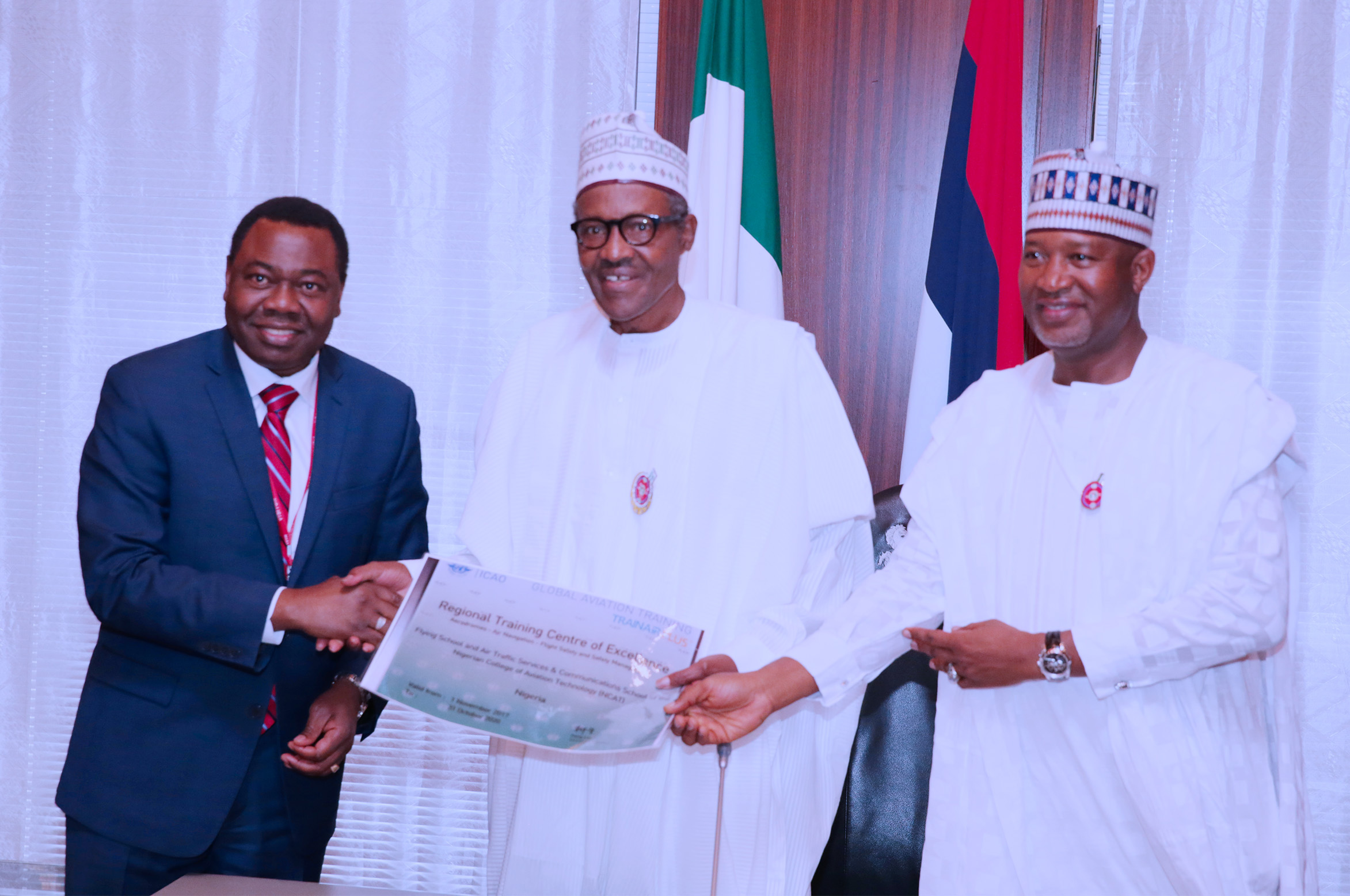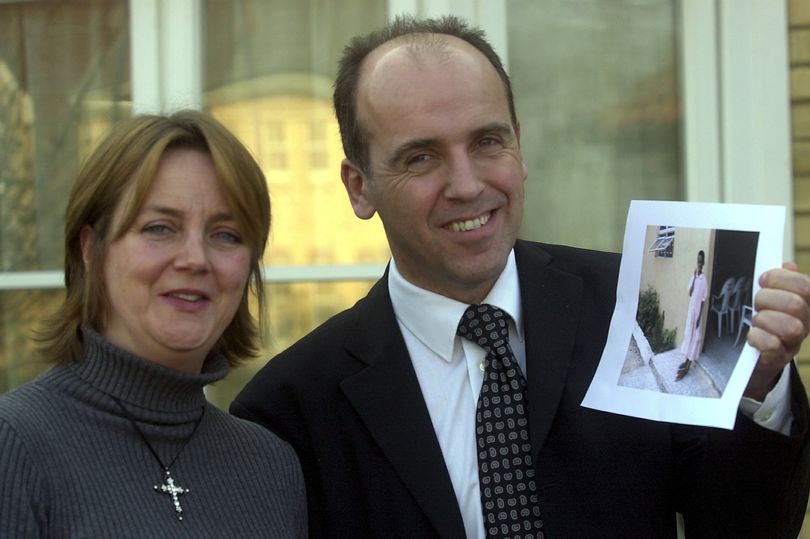PRESIDENT BUHARI RECEIVES AUDIENCE ICAO AND AFDB TEAM 2A&B. President Muhammadu Buhari (M) being presented with Certification of Abuja Airport and Lagos for meeting ICAO Standard by President of the Council International Civil Aviation Organisation (ICAO), Olumuyiwa Benard Aliu L(EFT) accompanied by the Minister of State Aviation, Sen Hadi Sirika during an audience, President of International Civil Aviation Organisation (ICAO) and President of African Development Bank (AFDB) at the State House in Abuja. PHOTO; SUNDAY AGHAEZE/State House. Nov 20, 2017.
I don’t know if these statistics would interest you: the aviation industry alone directly contributes $664.4 billion to global GDP yearly — and that is far more than Nigeria’s entire gross domestic product. Every year, over three billion passengers fly the world’s airlines. Over 50 million tonnes of freight are airlifted across the world. The direct jobs from these are close to 10 million. In the larger picture, the air passenger business supports 63 million jobs globally and triggers $2.7 trillion worth of value in the world’s GDP. It is said that if aviation were a country, it would be the 21st biggest economy in the world, just marginally out of the G20.
These statistics are probably outdated — I mined them from a 2016 report commissioned by the Geneva-based Air Transport Action Group (ATAG), a coalition of aviation industry experts. Most of the statistics were from 2014, meaning things have certainly changed in the last three years, and only for the better. Aviation industry keeps growing in spite of all the challenges. It is an industry that has an impressive fleet of activities generating jobs and businesses directly and indirectly: construction, supplies, aircraft manufacturing, information technology, consumer goods, banking, hospitality and so on. Aviation is, of course, a major artery for tourism, as we all know.
As we continue to discuss how to move away from our “petrocentric” economy — by which I mean an economy that relies mainly on the oxygen of petroleum resources to breathe — one sector that must begin to take its place of pride is aviation. The case for agriculture and industry has been well made by all and sundry. But, as things are turning out, Nigeria, with a population closing in on 200 million by 2020, needs to fully develop as many sectors of the economy as possible. There are millions of jobs and value-added outputs that are begging to be unleashed. The good news is that some sectors can fund themselves — all we need are good policies to open them up.
Aviation is one of such. Senator Hadi Sirika, the minister of state for aviation, has articulated a roadmap for the sector which, in my opinion, needs all the interrogation and fine-tuning it can use in the overall interest of national development. Sirika comes across as a man of conviction and determination — and I must confess I did not become his fan until after the successful rehabilitation of the runway of the Nnamdi Azikiwe International Airport, Abuja, early this year. I was one of those who thought that even though rehabilitating the runway was of utmost importance, shutting down the airport for six weeks was unthinkable. But here we are.
Advertisement
Turning Nigeria’s aviation to one of the most buoyant and active in Africa is not going to be a tea party. Countries such as Ethiopia, Morocco, UAE and Qatar have demonstrated that aviation can be a key driver of economic growth, but Rome was not built just like that. We talk about the successes of Ethiopian Airlines, Emirates and Qatar Airways all the time — and these are businesses that turn over billions of dollars yearly — yet we are unable to create our own success stories beyond saying that Lagos is one of the busiest airports in Africa and that Nigeria has a population of 185 million and all that. We are playing with the chickens when we should be soaring with the eagles.
According to Sirika, his vision is to build an aerospace and aeronautic university in partnership with the International Civil Aviation Organisation (ICAO), the specialised UN agency that regulates global aviation. We need high-level manpower, no doubt about that, and we must be able to produce that at home. Quite importantly, we also need to go into research and development. It is interesting that a country like Brazil, which entered into aviation industry about the same time with Nigeria, is now producing aircraft. It is a Nigerian thing, right? NNPC started out around the same time with Statoil of Norway and ENI of Italy — and that is where the comparison ends.
Sirika has also been very passionate about concessioning the airports. This has a lot of political implications — the unions are eternally opposed to private management of public assets, no matter the evidence that it is a better option for a country with weak public management capacity like Nigeria. The attraction, for me, is that the federal government will no longer be allocating funds to these airports. Most of them are commercially viable and should sustain themselves. But it pays some fat cats for budgetary allocations to keep pouring in every year. The Chinese, Singaporeans, Qataris and Saudis have chosen the concessioning route. We need to give it a chance too.
Advertisement
A more contentious issue is Sirika’s proposal for a national carrier. I have opposed this idea from day one. My argument has been that any business managed by government in Nigeria will not run well. I can give a million examples. We all know how Nigeria Airways nosedived into the abyss. Government officials were distributing free tickets to their girlfriends and relatives. It was anything goes. Virgin Nigeria, partly owned by Nigerian institutional investors and Virgin Atlantic, took off on a promising note but soon flew into turbulence and ended in oblivion. It has been one sad story after the other. Thank God Sirika says the proposed national carrier has a different business model.
Other aspects of the roadmap which I find noteworthy are the establishment of maintenance, overhaul and repair (MRO) services to cater for airlines in Nigeria (Morocco, Ethiopia and South Africa are excelling in this); setting up of a leasing company to provide affordable finance to aviation entrepreneurs; creation of world-class search and rescue operations to support eventualities in the sector; and the creation of agro-allied airports — a very big deal, in my opinion, if we are to succeed with export-oriented agric business. Jos airport once served as a centre for flower export while the Yola airport was used for mangoes and such like. That is history now. What a pity.
In a way, all these things are linked: training, research and development, concessioning of airports, MRO services to support the national carrier and other international airlines operating in Nigeria, provision of finance for aviation entrepreneurs, creating world-class search and rescue infrastructure, and designating airports for agric business. But the devil is always lurking at the corner. In this case, I am thinking of the bureaucracy. Virtually of all Sirika’s initiatives are going to be powered by the private sector, meaning there is less of government hands and finance involved. They sound good, but what about the agencies to implement and manage the process?
Again, that means restructuring and strengthening them. An agency like the Federal Airports Authority of Nigeria (FAAN), which has 45 GMs, cannot continue to operate the way it is. Every GM is on Level 17, with all the benefits and perks of office. This is incredible. That is how wasteful the Nigerian bureaucracy is and any attempt to reform it will always face resistance. Sirika’s roadmap talks about reviewing the laws setting up these agencies in order to make them more efficient. He also says the Nigerian Civil Aviation Authority (NCAA) will become fully autonomous in order to exercise its regulatory oversight unencumbered. That is non-negotiable.
Advertisement
In a way, things have been looking up for the Nigerian aviation industry. ICAO has just held its World Aviation Forum in Abuja — the first outside its headquarters in Montreal, Canada. That was a huge honour to the country and an apparent recognition of our potential and positive strides. Indeed, ICAO just issued a certificate to designate the Nigerian College of Aviation Technology, Zaria, as a Centre of Excellence for the West and Central Africa region — and that takes NCAT to the top 20 of the best training schools in the world. The Nigerian Meteorological Agency only recently got ISO 9001:2015 certification — the only African meteorological agency with that badge.
I travel fairly often and I am saddened whenever I see the state of our airports, but I am much more demoralised when I see what Emirates and Qatar Airways are doing. We are far behind them. However, we need not beat ourselves too much: we are well positioned to write our own story with our own hands. If Sirika can implement the aviation roadmap with the same grit and guts that he displayed in closing down Abuja airport to rebuild the runway, then there will be much more to celebrate under his watch. I’m happy he engaged extensively with the stakeholders over the roadmap. They can do and undo. All going well, we can hit another oil — this time in the skies.
AND FOUR OTHER THINGS…
ATIKU TICKLES
Whether or not he becomes president, Alhaji Atiku Abubakar will go into history as one of the politicians that brought real excitement to the game in Nigeria. His resignation from APC on Friday, apparently on his way back to the PDP, has brought some vigour back to the polity. Politicking has really been super dull since the PDP was decapitated in the 2015 elections. With virtually everybody singing “Sai Baba!” in APC today, it looked like the 2019 presidential election was going to be a walk-over for President Muhammadu Buhari — who is definitely gunning for a second term. It is now looking increasingly likely that the PDP will field Atiku against him. Tickling.
Advertisement
DSS VS EFCC
When two security agencies clash physically — not just verbally — it is time for the rest of us to worry about our safety. The face-off between agents of the Economic and Financial Crimes Commission (EFCC) and Department of State Services (DSS) in Abuja on Tuesday is beyond shameful: actually, the security of the country is at risk. EFCC officials, we were told, were trying to arrest the former DSS director-general, Mr. Ita Ekpeyong. The DSS agents repelled them, so to say. Now, this is no longer a question of who is right or wrong but an indication of serious problems of co-ordination of security agencies under this administration. Frightening.
Advertisement
KILLING SOFTLY
Maryam Sanda, the woman who reportedly stabbed her husband to death, has been dominating the airwaves. She allegedly killed her husband, Bilyamin Bello — son of Alhaji Haliru Mohammed Bello, former PDP chairman — over some messages she saw on his phone. This is a rare case of domestic violence in which the man is at the receiving end. This could distort, or undermine, the war against domestic violence in Nigeria. But this should not be solely about Sanda. I think we need to start thinking about making anger management core to premarital counselling. I also think that couples should stop snooping on each other’s phones. Trouble.
Advertisement
MUGABE MEMES
On a lighter note, one of the things I am going to miss with the exit of Robert Mugabe as president of Zimbabwe is the “Mugabe said” memes on social media. Someone would just take an African proverb or invent a quote and attribute it to Mugabe, such that Mugabe “quotes” started competing with those of Aristotle in philosophical nature or Mark Twain in wit. Almost every funny saying was being attributed to Mugabe! This is certainly one of my favourites: “It’s hard to bewitch an African lady these days. Every time you take a piece of her hair to the witch doctor, either an innocent Brazilian woman gets mad or a factory in China catches fire.” Hilarious.
Advertisement
Add a comment







